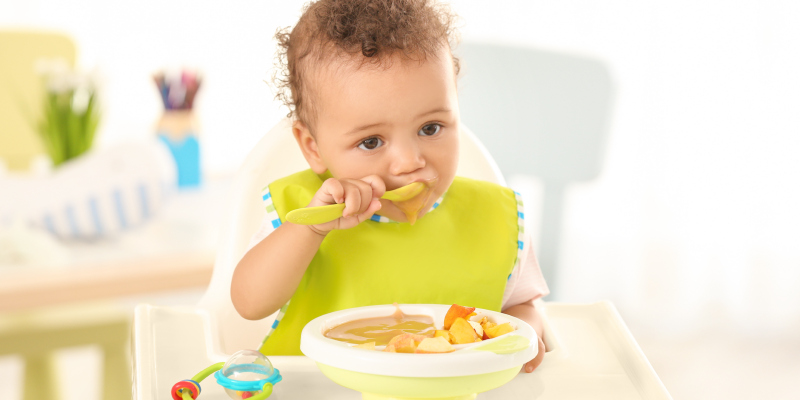
“Super” foods you should feed your baby
At around 6 months old, you should start introducing solid foods to your baby. Up to this point, babies survive just fine on breastmilk or formula as a source of iron. And also because they use iron stored in their body from being in the womb. But as babies grow, their iron storage gets depleted and around six months, they can’t get the iron they need from breastmilk or formula alone. Babies need solid food for iron and other essential nutrients for growth and development. And although we typically think of baby food as rice, and pureed veggies, there are other foods that can provide a bounty of nutrients. These are foods that you should feed your baby that you probably aren’t feeding her right now.
Nut butters
Recent guidelines from the American Academy of Allergy, Asthma and Immunology have reversed earlier caution that babies should stay away from nuts. You are now advised to introduce nuts to your baby as early as 6 months, once they’re used to other first foods. Nuts (peanuts, cashews and almonds) provide protein, beneficial fatty acids, Vitamin E and minerals like manganese, potassium and iron. To make the nut butter thin enough for babies to consume, try mixing it in cereal or putting a dab onto a piece of toast as finger food. A word of caution: if your family has a history or peanut allergies, or your baby already exhibits signs of allergies, talk with your allergist first before giving your baby nut butters.
Eggs
The versatility of eggs make them a perfect first food for babies as they are easily digestible. They are also loaded with important nutrients like iron, folate, choline, protein, and vitamins A, D and E. There are so many ways to serve eggs to your little one, too! Mash a hard-boiled egg and add it to formula or breastmilk. Or serve a hard-boiled egg cut up in chunks as finger food. Scrambled eggs are also perfect for little fingers to grasp and eat.
Butter
There’s a misconception that fat is bad, or that we shouldn’t consume much of it. The American Academy of Pediatrics notes that saturated fat and cholesterol play an important role in brain and nervous system development. Because of that reason, parents should not be restricting fat in children under two. In addition, it helps them get full and absorb fat-soluble vitamins. Consider mixing butter or olive oil into pureed foods or add avocado and cheese as finger foods.
Beans and lentils
Beans and lentils are an excellent choice to add to your baby’s solid food diet. They provide a great source of protein, iron, folate, zinc and manganese, all nutrients that developing babies need. Once you’ve cooked beans and lentils until they are super soft (try soaking overnight after they’ve been cooked), you can puree or add them to soups and stews. They also make excellent finger foods that will keep baby busy!
Tofu
Tofu is another food that you should feed your baby and probably haven’t considered it! Like nuts, doctors used to advise against it for fear of potential allergies, but they’ve changed their stance. Tofu boosts iron, zinc, protein and fat and is perfect for families living a vegan diet. Plus, it’s easy for little ones to chew. If your kids don’t like eating it plain, try adding to smoothies or puddings.
Wheat crackers and bread
Gluten is another potential food sensitivity that parents stay away from. The misconception is that limiting it early on can prevent celiac disease. Some studies suggest keeping wheat away may increase the risk, but the answer is not definitive. For babies just starting on solids you can try wheat farina or Cream of Wheat. If they’ve graduated to solids try giving them crackers or whole wheat toast strips.
Plain yogurt
The key with yogurt is to choose a full-fat variety and go with the plain flavor to begin with. Flavored yogurts are typically packed with sugar, and it also gives your child a chance to acquire a taste for yogurt at all. Full fat yogurt is best since babies need 50% of their diet to come from fats.
Red meat
Red meat is an obvious choice for iron-rich nutrients, but it’s another food babies should eat that parents don’t consider. The American Academy of Pediatrics totally ships this choice as dark poultry and red meat are iron- and zinc-rich foods babies need, especially if you’re breastfeeding. Iron provided from these meat sources is absorbed better than plant sources. To up the absorption add Vitamin C-rich foods like vegetables.
The overall goal for introducing solid foods to your baby is to aid in her development, and help her graduate to regular foods by the time she reaches 12 months. By trying some of these “out of the (cereal) box” foods now, she is one step closer to having a diverse palate.
Join the other 100,000+ new parents who love Bitsy Boxes.

